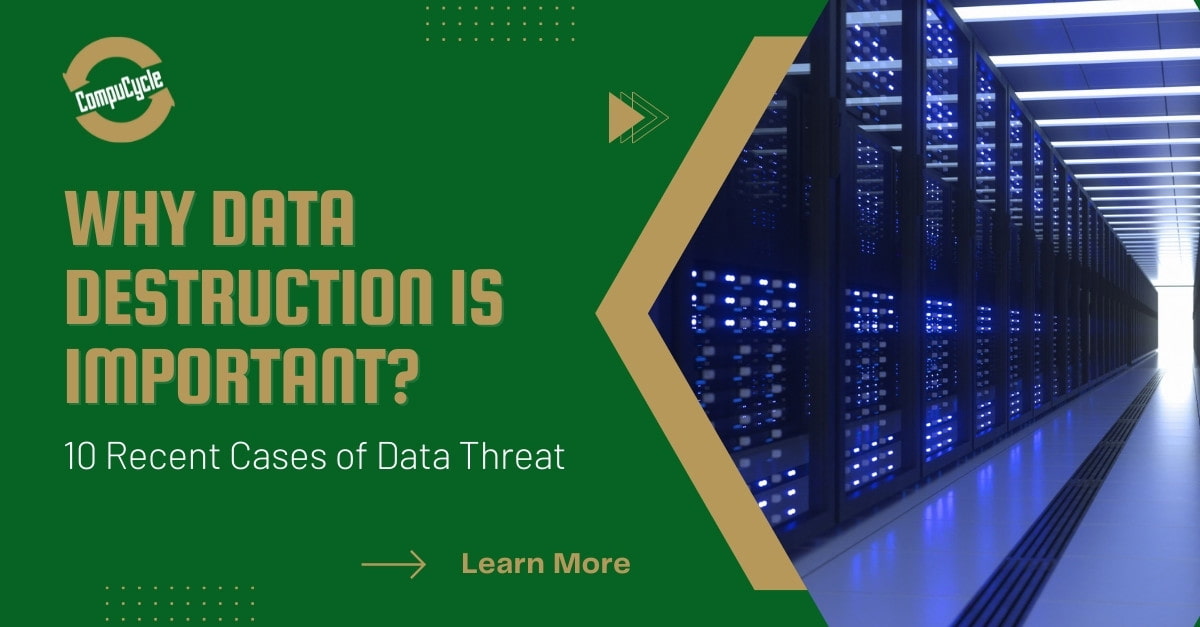How to Integrate Data Destruction Techniques into Your Cyber Security Strategy
How to Integrate Data Destruction Techniques into Your Cyber Security Strategy
Blog Article
The Crucial Nature of Information Damage in Upholding Computer System Security Services and Protecting Versus Unauthorized Accessibility
In an era where data violations and identification theft are increasingly common, the importance of reliable information damage can not be overstated. Various methods, from information wiping to physical damage, offer as important safeguards against unauthorized accessibility.
Importance of Data Devastation
In a progressively electronic world, the value of information destruction can not be overstated. As companies accumulate vast quantities of delicate info, the potential consequences of stopping working to correctly get rid of and manage of that information end up being increasingly extreme. Data breaches, identification burglary, and company espionage position significant hazards, emphasizing the necessity of effective data damage methods.

Moreover, as technology advances, so too do the methods through which harmful stars seek to manipulate delicate details. Organizations needs to stay proactive and attentive in their data damage strategies to protect versus these advancing risks. By focusing on data devastation, companies not just protect their assets but likewise foster trust fund among clients and stakeholders, demonstrating a dedication to accountable information management and protection techniques.
Methods of Effective Information Damage
To guarantee the irreparable and total devastation of sensitive data, companies can use a variety of reliable approaches customized to their details demands. Among one of the most typical methods is information wiping, which entails utilizing specialized software program to overwrite existing information numerous times, making healing essentially impossible. This is especially beneficial for solid-state drives and difficult drives, where typical removal techniques are inadequate.
Another reliable approach is degaussing, which uses solid electromagnetic fields to interfere with the magnetic domains on storage media, rendering the data irretrievable. This approach is especially fit for magnetic storage gadgets, such as disk drive and hard drives.
Physical devastation is likewise a sensible option, entailing the shredding, squashing, or incineration of storage devices. This method assurances that data can not be recuperated, making it suitable for organizations taking care of highly sensitive info.

Conformity With Data Protection Regulations
Organizations have to not just concentrate on reliable data destruction approaches however likewise guarantee compliance with information security laws that govern exactly how sensitive information is managed and dealt with. Adhering to these laws is essential for preserving and protecting individual data customer trust. Laws such as the General Data Protection Regulation (GDPR) in the European Union and the Health And Wellness Insurance try this site Coverage Portability and Liability Act (HIPAA) in the United States impose rigorous standards on information administration, that include needs for the secure disposal of sensitive info.
To achieve compliance, companies should apply extensive data devastation policies that align with these lawful structures. This consists of recognizing data that calls for devastation, developing procedures for secure methodsâEUR" such as shredding physical media or making use of software that meets market criteria for information wipingâEUR" and keeping comprehensive records of destruction activities. Normal audits needs to be conducted to make sure adherence to these plans and to recognize any kind of possible areas for renovation.
Failure to follow data defense policies can result in considerable lawful ramifications, consisting of large penalties and damage to an organization's track record. As a result, integrating conformity into information devastation techniques is not only a lawful commitment yet additionally an essential element of a durable information safety and security method.
Repercussions of Poor Information Handling
Poor information handling can cause severe repercussions that prolong beyond immediate functional troubles. Organizations might deal with substantial economic losses as a result of data breaches, which typically cause pricey removal initiatives, lawful charges, and governing fines. These monetary effects can stress sources and prevent development, eventually influencing an organization's lower line.
Moreover, inadequate data handling can badly harm an organization's credibility. Consumers, stakeholders, and companions may lose rely on an entity that fails to secure sensitive information, bring about decreased consumer commitment and prospective loss of company opportunities. This disintegration of trust can take years to reconstruct, if it can be brought back whatsoever.
In addition, organizations might deal with lawful ramifications emerging from non-compliance with information security policies. Such offenses may cause examinations and penalties, worsening the financial worry and additional staining the company's photo.
In the realm of cybersecurity, inadequate data administration techniques can develop vulnerabilities that make systems a lot more this contact form susceptible to unauthorized gain access to and cyberattacks. Inevitably, these effects highlight the critical significance of applying durable information taking care of treatments to safeguard sensitive information and keep business honesty.
Ideal Practices for Secure Data Disposal


Firstly, data need to be categorized according to its sensitivity. Sensitive details needs a lot more rigorous disposal techniques, such as shredding physical records and making use of innovative software application for electronic information cleaning. Utilizing certified information destruction solutions makes sure compliance with industry regulations and criteria.
Second of all, companies should implement a click for more info data disposal plan that mandates routine audits. This plan ought to describe the procedures for data retention and destruction, ensuring that outdated information is dealt with promptly and firmly. Educating employees on these procedures is necessary to cultivating a culture of security awareness.
Lastly, maintaining thorough records of disposed information enhances liability and gives a clear audit path. This documents must consist of the kind of data damaged, the approach used, and the day of disposal.
Conclusion
Embracing robust methods such as data cleaning, degaussing, and physical damage, along with compliance with laws like GDPR and HIPAA, is crucial for securing delicate details. Neglecting correct data disposal techniques can lead to extreme effects, consisting of information breaches and legal consequences.
In a period where data breaches and identification burglary are significantly prevalent, the importance of effective information destruction can not be overemphasized. data destruction. Data violations, identity burglary, and business reconnaissance posture substantial dangers, underscoring the necessity of efficient data devastation practices
Compliance with laws such as GDPR and HIPAA mandates that organizations execute rigid information security actions, including the safe and secure devastation of data at the end of its lifecycle.
By prioritizing data damage, companies not just secure their possessions however also foster trust fund amongst clients and stakeholders, showing a commitment to accountable information management and safety practices.
Organizations have to not just focus on efficient data destruction approaches however likewise make sure conformity with data security guidelines that control how delicate information is taken care of and disposed of.
Report this page